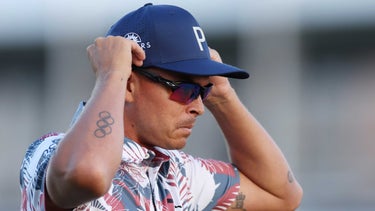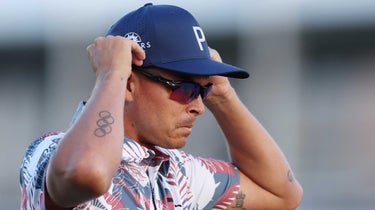Hayden Springer, who came to Bermuda at No. 125 in the FedEx Cup, shot a 6-under 65 for a share of the lead at the Butterfield Bermuda Championship.
Rickie Fowler isn’t interesting. At the U.S. Open, he’s much more than that.

Rickie Fowler survived a career in professional golf without saying anything interesting. At the U.S. Open, though, he’s downright thrilling.
The post Rickie Fowler isn’t interesting. At the U.S. Open, he’s much more than that. appeared first on Golf.
Rickie Fowler survived a career in professional golf without saying anything interesting. At the U.S. Open, though, he’s downright thrilling.
The post Rickie Fowler isn’t interesting. At the U.S. Open, he’s much more than that. appeared first on Golf.
LOS ANGELES — Allow me to be the first to break the bad news: Rickie Fowler has never said an interesting word.
Don’t believe me? Let’s try an exercise: when was the last time you heard Rickie say something outside of a television commercial?
Still thinking?
Of course you’re still thinking. This is Rickie’s gift: he has managed to survive the better part of a professional career in golf without saying anything of substance — and he’s done so as arguably the sport’s most omnipresent figure.
His interviews drag like the end of a bad movie. His press conferences sound like filibusters. His preferred cliches are so tired they ought to head to bed. His commercials are…commercials. Most times, it feels as if Fowler’s words are a suit of armor protecting him from the thing he’s really thinking.
From Saturday evening’s U.S. Open presser, shortly after Rickie entered a tie for the 54-hole lead:
“Really doesn’t matter, having the lead, being one back, two back. You’re going to have to play good golf tomorrow,” he said, apparently unaware that he had just recycled a year’s worth of bad golf axioms.
From the same presser, on his 18th hole bogey:
“Bummer to have that one slip away, but tomorrow is a whole new day, and like I said, that’s kind of when the tournament really starts.”
From the same presser, on the story of the week, his bid to win his first major championship at LACC.
“I mean, obviously it would be huge,” he said. “It would be great.”
At these levels of verbal boredom, it’s impressive Fowler has ascended to becoming one of the sport’s most transcendent stars. But then again, most of us don’t spend much time watching Fowler speak. And if you’ve watched him this week at Los Angeles Country Club, you know words couldn’t possibly do that side of Rickie Fowler justice.
On Saturday, Fowler became the fastest player in U.S. Open history to reach 20 birdies or better, besting Brendan Steele’s 2017 mark by some eight holes. He continued a stretch of out-of-nowhere dominance that will give him at least a share of the first, second, third and final round leads at this year’s U.S. Open. He made both heroic birdies (his impossible 69-foot make on the 7th) and soul-crushing bogeys (his three-foot horseshoe miss on the 18th). He treaded water during a second-straight topsy-turvy round with the lead at a golf course designed, in part, to shatter dreams. He found himself on the brink of both the thing he wants most (a major victory) and the thing he is most tortured by (years worth of near-misses).
It is easy to forget how improbable this run is for Fowler. The last three years have not been kind to Rickie, who fell from the peak of the sport to the fringes of PGA Tour status, ranked outside the top 150 in the world. Slowly, his name became more synonymous with his corporate partners than it did with his chosen profession. His commercials became a punchline. His game drifted further.
Just a year ago, Fowler found himself on the outside looking in on U.S. Open qualifying. But on Sunday, he will enter the odds-on favorite to emerge from a pool of more than 10,000 golfers to win this event.
Even the most hardened optimist would find that hard to believe, even with his game pointing in the right direction these last few months.
“I would say a big part of my composure is just what I dealt with the last few years,” he said. “I had never necessarily dealt with that big of a low for that long of a time.”
It will not be easy for Rickie, who has not won a professional event since 2019, and whose major championship history is littered with heartbreak. To date, he has finished second in all but one major, the PGA, where in 2014 he finished third.
He will need a fourth consecutive extraordinary performance on Sunday (and perhaps a bit of luck) to exorcise those demons. Thankfully, this hasn’t been an ordinary week.
“I mentioned it yesterday and I still stand by it,” Fowler said. “This is the best I’ve felt, let alone in a normal tournament but especially a major, and I would say really ever in my career.”
It’s hard to say what a victory might look like for Fowler, who has long kept his emotions close to his chest and his eyes hidden behind the dark blue shades. Saturday night’s press conference did not provide many clues.
But it did provide one. That came just before he stepped down from the lectern and shuffled off into the darkness, left to sleep on a 54-hole lead for the first time in a very long while.
“We have a chance tomorrow,” he said. “I’m not scared to fail. I’ve dealt with that.”
So yeah, we’ll just go leave it all out there,” he said. “I’m not scared to be wherever we’re at.”
U.S. Open Sunday may be many things for Rickie Fowler, but it sure won’t be boring.
No matter what he says.
The post Rickie Fowler isn’t interesting. At the U.S. Open, he’s much more than that. appeared first on Golf.

